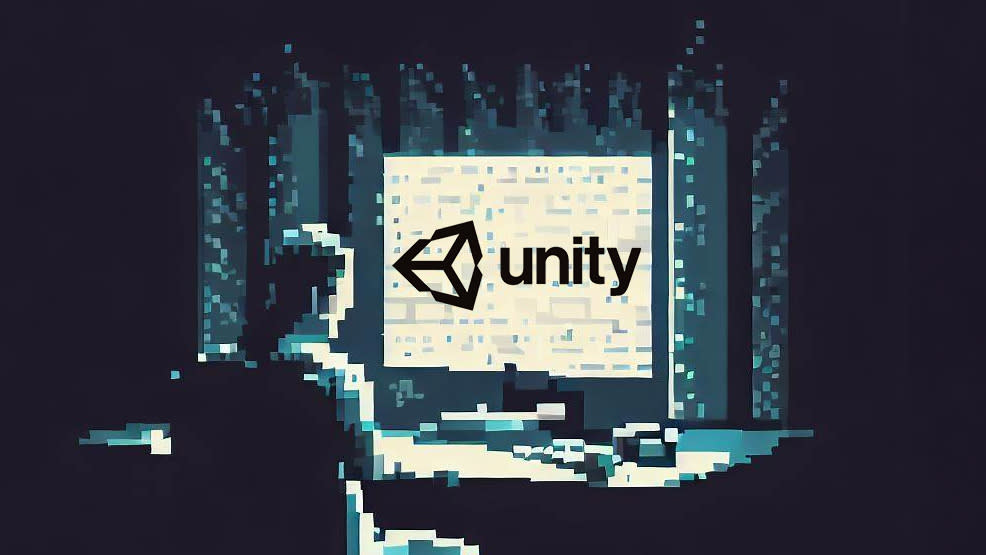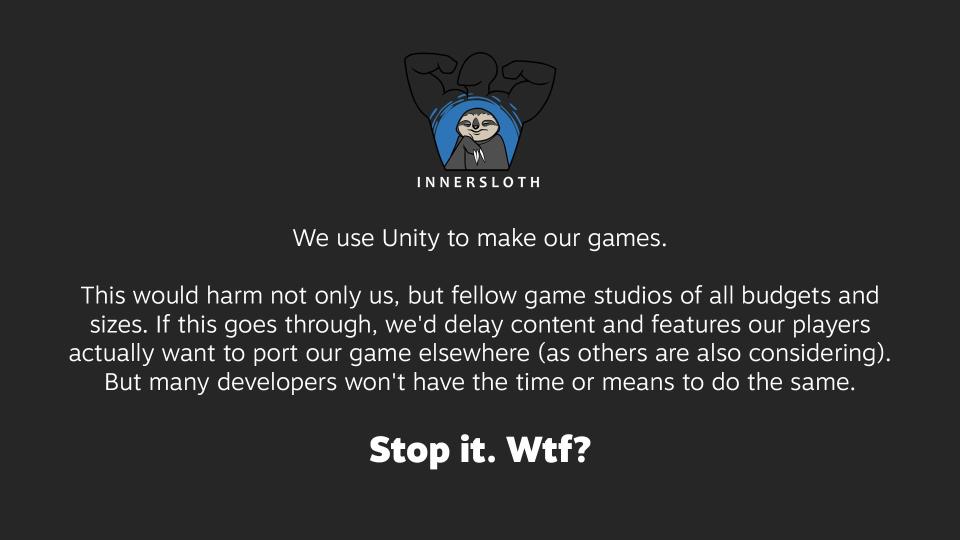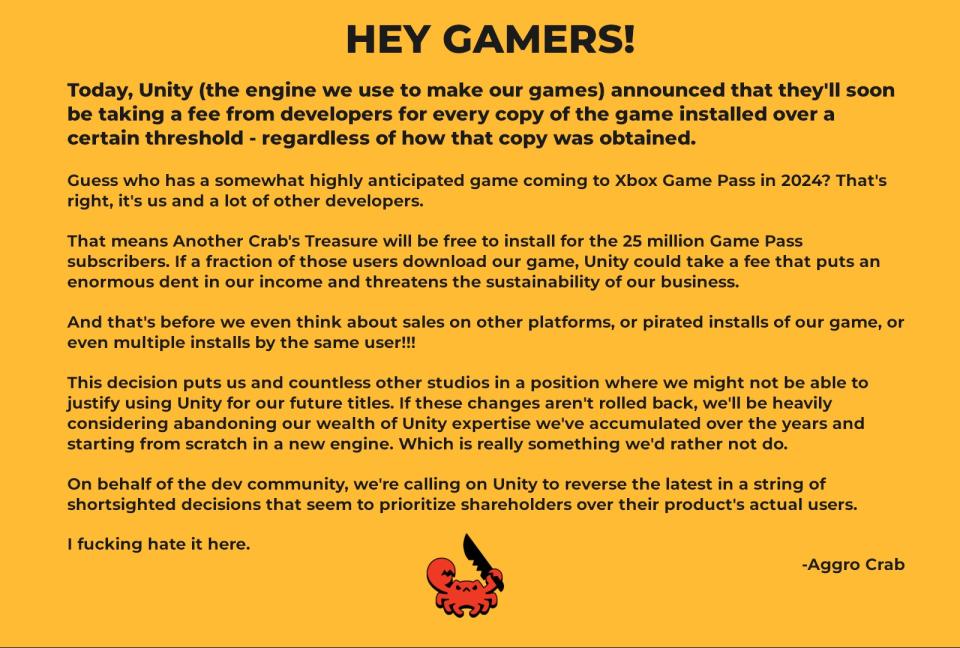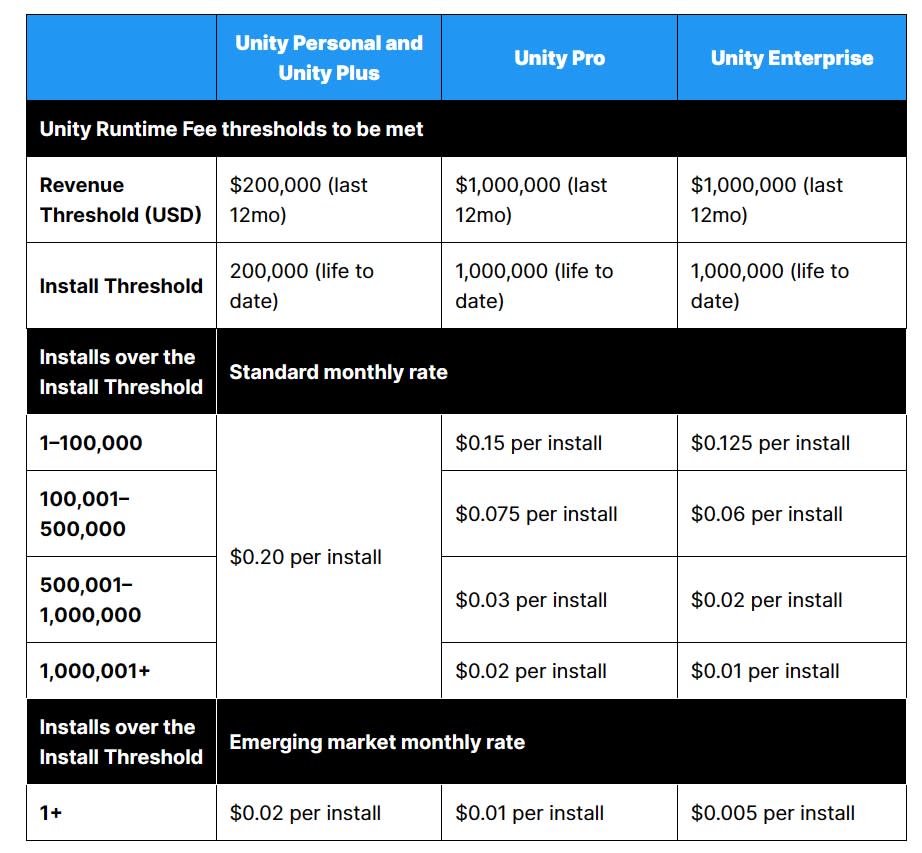Unity has introduced new fees that could have dire effects on the entire game industry, from indies to Xbox Game Pass (UPDATE)

What you need to know
Unity is a popular engine often used by smaller teams, owing to its oft-comparatively lower fees.
Today, the firm announced that it will follow other engines in charging a runtime fee, starting January 1st, 2024.
The fee could potentially impact installs made via services like Xbox Game Pass, hurting the viability of business deals around the platform.
UPDATE Sept. 13, 2023: Unity issued a statement saying that it intends to pass on the costs to Microsoft and other platform holders for installations incurred via subscription fees. We've reached out to Microsoft to comment on that.
Read on for more details.
UPDATE (Sept. 13, 2023): Unity has issued some "clarifications" around certain aspects of the deal, although it continues to endure heavy criticism from every side of the industry.
Stephen Totilo of Axios reported that Unity intends to pass on the costs for installation fees to Microsoft and other subscription providers for services like Xbox Game Pass and PlayStation Plus. We've reached out to Microsoft to comment on this, since it appears that Unity seems to be making this up its policies as it goes along. Unity also said that it will waive all the installation fees for developers who adopt its ads platform on mobile, in a coercive move which one developer at a major mobile publisher stated to me could be in breach of EU contractual law.
George Broussard of 3D Realms fame also reported that Unity was warned internally that it would be hammered for failure to clarify things like fraud and Xbox Game Pass, but shipped the blog post anyway. Outlets like Eurogamer have also highlighted the fact that Unity's CEO and other execs mysteriously offloaded a bunch of stock in the past month as if they knew this particular announcement would be incredibly unpopular.
As of writing, Unity is sticking to its guns, despite companies like Among Us' InnerSloth and Cult of the Lamb publisher Devolver Digital implying or outright confirming plans to move away from Unity as a platform.
Keen to capitalize on Unity's meteoric fall from grace, rising engine Godot announced a new fund to help its platform grow. Godot is a free and open source alternative to Unity, and has been rising in popularity since former EA exec John Riccitiello took over the firm. John Ricciteliello became notorious in the past for saying that developers who don't focus on microtransactions are "fucking idiots," while also saying he'd like to charge Battlefield players to reload their guns.
UPDATE (Sept. 12, 2023): More developers react.
More developers are joining the debate surrounding the new Unity revenue model, including Innersloth, most known for its hit multiplayer game Among Us. Innersloth added its own message on top of Aggro Crab Games, adding to the growing call for Unity to reverse its decision.

Innersloth has stated that the change to Unity's revenue model would directly lead to the studio delaying content and features in order to port Among Us to another game engine. Of course, there are plenty of studios and independent developers that wouldn't have the resources necessary to make such a move, which makes matters even more dire for indie games built on the Unity engine.
Massive Monster, the creator behind the excellent Cult of the Lamb joined the fray, too, telling players to buy Cult of the Lamb now before it deletes the game on Jan. 1 (when Unity's new revenue model goes into effect). It's said in a joking fashion, but also highlights that even delisting the game would potentially not stop Massive Monster from accruing fees, since Unity will be tracking installs, not purchases.
Our original article (and first update) continues below.
UPDATE: This article was originally published on Sept. 12, 2023, and was updated at 4:20 p.m. CT on Sept. 12 with new information.
Developers have begun openly decrying the new changes at Unity, requesting that the company go back on the new per-install fees lest they're forced to abandon the game engine in favor of something else. One notable example comes from Aggro Crab Games, which is working on the highly-anticipated Another Crab's Treasure coming to Xbox, Windows PC, and Xbox Game Pass in 2024.

The Aggro Crab Games team expresses concern that Unity's new model will disproportionately affect indie developers, especially those that take advantage of Xbox Game Pass to reach huge new swathes of potential players. If even a fraction of the over 25 million Xbox Game Pass subscribers download an Aggro Crab Games title built on Unity, for example, the resulting fee could significantly hurt the studio and its ability to continue producing games. This is before considering pirating, multiple installs from the same user (and potential spamming on this front), and releasing on different platforms.
The reaction to Unity's decision to implement per-install fees on games above a certain level of success has been almost unerringly negative from both developers and the video games community. It remains to be seen if the public outcry will affect Unity's decision, but we'll keep this space updated with every new development. Our original article continues below.
Unity is a popular game and app development platform, often touted for its cross-platform friendliness and accessibility for smaller teams. Unity has been at the forefront of independent development for some time, although a string of unpopular changes in the past couple of years have dramatically battered its image. The changes kicked off in line with its public stock exchange listing a couple of years back, generally speaking, as it seeks to compete with Unreal Engine and others in an increasingly competitive, and volatile market.
Volatile indeed, as these recent changes to Unity's revenue models threaten to upend entire businesses, and plunge projects into turmoil before they've even gotten off the ground.
Unity's new model will see developers pay a monthly fee per installation, scaling up at certain thresholds. The breakdown of the fees per revenue thresholds is as follows.

The per-install fees don't seem to account for game usage time, and there's no information on whether these metrics will factor in pirated copies as well. The per-installation fee also threatens charity services like Humble Bundle, free-to-play titles, or even Xbox Game Pass — where games are less likely to go on to generate ongoing revenue via in-app purchases. If someone downloads a title on Xbox Game Pass and tries it out for just 15 minutes, with no intention to purchase later or get invested, this has some dire potential ramifications for developers who take on the Xbox Game Pass model. Unity has yet to really clarify how the fees may or may not be waived in certain scenarios.
One developer remarked that some metrics could see Unity stand to profit from a freemium game more than developers of certain sizes.
> make a game> game is fremium> game makes 200k from in-app purchases after being installed 3 million times > now owe Unity 20c per 2.8M installs, $560K> that’s 360K more than we made https://t.co/6fe6Ob35OjSeptember 12, 2023
Another developer, Tomas Sala known for the excellent flight action game The Falconeer, also expressed concerns about Unity's handling of this quite massive change. Games and projects that are currently in development will have not factored in the additional fees Unity plans to levy, throwing existing plans into turmoil.
What I also dislike also about this @unity debacle. I already committed to their engine for my new game. Put years and years of work into my pipeline. I did so under a simple per seat license I am happy to pay.Now while I am close to release they spring something new on me.…September 12, 2023
Unity as a business has not had many profitable quarters. For 2022, its operating income was negative one billion dollars, which is less than ideal by most metrics. In May of this year, Unity also announced it would commit to mass layoffs to reduce costs, shedding 6% of its global workforce. Unity's share price is down 55% since its initial public offering, and down 10% for this year alone, as the platform continues to seek consistent profitability.
Disunity
Unity's financially accessible models previously gave it a competitive advantage over Unreal Engine, which operates some similar fees for game developers using its platform. With that advantage being eroded, it remains to be seen if developers pack up and move to greener pastures. It also remains to be seen how it could impact deals for subscription services like Xbox Game Pass or PlayStation Plus, which often feature Unity-made independent games from smaller teams, often at lower prices.
Unity's fees eating into the margins may make certain ventures increasingly unviable, in what is proving to be a particularly strange, volatile market. 2023 has seen studio closures and layoffs a' plenty, as consumers feel the pinch of inflation and increased prices around the world. Unity is potentially playing a dangerous game here, but it remains to be seen what impact this could have on its business at scale, once it rolls out on January 1st, 2024.


